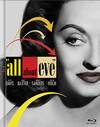





A Tree Grows in Brooklyn (1945)
Cast | Crew | Awards | Articles | Lyrics | Downloads | Image Credits
| Article 2 |
Family Values Grow in Brooklynby Keith L. Runyon, The Louisville Courier-JournalGannett News Service May 24, 1993There's nothing more satisfying than discovering the joys of a book you've known about for a long time - but somehow never got around to reading. I've had just that pleasure in the last week as I became acquainted with the Nolans of Brooklyn, central characters in Betty Smith's endearing book, "A Tree Grows in Brooklyn." Published in 1943, HarperCollins has recently reissued the novel in an attractive paperback edition. Certainly a novel with its distinguished history merits further attention: - It was the first work of fiction by a woman to occupy first place on the New York Times best seller list - 22 weeks in the No. 1 slot, 59 weeks in all. - Then in 1945, "A Tree Grows in Brooklyn" became a popular film, winning Oscars for actor James Dunn, who played the father, Johnny Nolan, and for young Peggy Ann Garner, as his daughter, Francie. Betty Smith (1897-1972) was born in Brooklyn, but she did most of her writing in Chapel Hill, N.C., where she had gone to study playwrighting in 1938 - and stayed on. It was there, as a young divorcee with two daughters, that she wrote "A Tree Grows in Brooklyn," recalling the New York borough of her youth and vividly creating young Francie Nolan, whose determination and basic decency make her every bit as appealing today as she was in 1943. In a time when so much energy is devoted to whether anyone cares about "traditional" family values, the story of the Nolan family is instructive. Johnny, the father, is a drunk. A sweet, well-intentioned, God-fearing drunk, but a drunk all the same. And he can't hold down a job so he picks up work as a singing waiter. Still, there's something endearing about him that defies serious condemnation. His wife, Katie, supports her family by scrubbing floors and ironing, instilling in young Francie and her little brother Neeley the honor of hard work and the love of learning. Encouraged by her own mother, an illiterate Austrian immigrant, Katie reads to the children every night: one page of the Bible and one page of Shakespeare. And from Katie's sister, Sissy, the children learn about hope and imagination. Sociologists today would denounce or pity the Nolans. They are dirt poor, to be sure. And though the parents love their children, and treat them pretty well, some would accuse Katie and Johnny of neglecting them. And therapists would fret over the children - products of a "dysfunctional" family. Co-dependents forevermore? Perhaps. Yet, I come away from "A Tree Grows in Brooklyn" believing that there was so much about the Nolans that was of immense, and lasting, value. I cried when Johnny died on Christmas Day 1915, and I cheered when Francie graduated the next spring. I felt pride when Neeley wore his first long pants to his papa's funeral, and I was heartsick when Katie had to break open her bank to pay the bills. This is what memorable fiction is all about. Betty Smith's writing is sharp and witty. And so very wise. For instance: At one point Katie laments to her sister that Johnny is "a drunk." So? responds the sagacious Sissy, "everybody's something." This is a wonderful book - suitable for all ages - in which a young girl's life emerges, like the leaves on the branches of the glorious tree outside the window of her Brooklyn tenement. It deserves to be read, and read again. © 1993 Gannett Company, Inc. |
|
Return to the
Index of Articles. |
| Now in Print! |
|---|
| Now on DVD! |
|---|
Buy Videos & DVDs |
|
Buy Movie Posters |
|
Buy Movie Posters |
|
Classic
Movie Merchandise |
|
![]() Printer-friendly version.
Printer-friendly version.
![]() Return
to the top.
Return
to the top.
Last updated:
March 10, 2011.
Reel Classics is a registered trademark of Reel Classics, L.L.C.
© 1997-2011 Reel Classics, L.L.C. All rights reserved. No
copyright is claimed on non-original or licensed material.
Terms of
Use.









